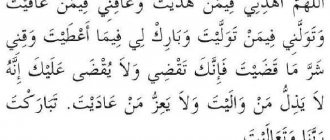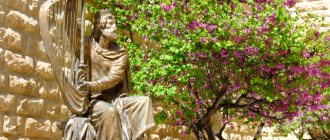Importance of saying prayers after adhan in Islam
Azan appeared in Islam after the migration of the Muslim community, accomplished thanks to Muhammad, to Medina from Mecca. The Prophet decided that true believers needed a certain speech that gathered everyone for prayer 5 times a day. The celebration serves as a message to the living about the power of Islam and the liberation of Muslims. By reading dua, people continue the good work of Muhammad and unite with fellow believers. The adhan contains the good wishes of Muslims - happiness, protection of the one and only God.
Dua is a continuation of the sacred action. It is appropriate for everyone who has pronounced the adhan or heard the speech of the muezzin to recite the text.
A Muslim has the opportunity to ask for something for himself and his family. If you follow all the rules: read the prayer during prayer, immediately after Tashahhud, then read the dua after the adhan, then the great prophet Muhammad will become an intercessor, protect from troubles, drive away the devils, doubts, and give blessings. You need to pronounce the words correctly, listen to the muezzin, understand the true meaning of what is said, and not perform a sacred act because of honoring traditions.
Muntaqa
Azan is a call to prayer, and Iqamat is an announcement of its beginning. The words of adhan are pronounced more slowly and drawn out, and the words of iqama are pronounced faster. Several types of azan and iqamat came from the sunnah and from the companions, and each group of jurists leaned towards the one that they considered a higher priority for their own practice and recommendation to believers.
Let us consider the types of azan and iqamat according to the form chosen by each of the four legal schools of Ahlu al-Sunnah. So that the ignorant can master this type of worship and learn how to recite the adhan by following the great Islamic scholars. So that anyone wishing to follow a particular one of these schools can find an accessible description of how to do so. And so that the one who knows only one form of azan and iqamat is not surprised when he hears another, and does not rush to correct or condemn the muazzin. [A muazzin is one who proclaims the words of the adhan, calling for prayer].
Words of adhan and iqama in the Hanafi madhhab
Azan form:
Allahu akbar, Allahu akbar. Allahu akbar, Allahu akbar. Ashhadu alla ilaha illa Allah. Ashhadu alla ilaha illa Allah. Ashhadu anna Muhammad-r-rasul Allah. Ashhadu anna Muhammad-r-rasul Allah. Haya 'ala-s-salaah. Haya 'ala-s-salaah. Haya 'alal-falah. Haya 'alal-falah. Allahu akbar, Allahu akbar. La ilaha illa Allah.
اللهُ أكبرْ ، اللهُ أكبرْ . اللهُ أكبرْ ، اللهُ أكبرْ أشهد أن لا إلهَ إلا الله . Please contact us. أشهد أن محمداً رسول الله حيِّ على الصلاة . حي على الصلاة حيِّ على الفلاح . حي على الفلاح اللهُ أكبرْ . اللهُ أكبرْ لا إله إلا الله
Listen:
The meaning is something like this:
Allah is great. - 4 times. I testify that there is no god but Allah. - 2 times. I testify that Muhammad is the Messenger of Allah. - 2 times. Hurry to prayer. - 2 times. Hurry to success. - 2 times. Allah is great. - 2 times.
In the adhan for the morning (Fajr) prayer, after “Hayya 'alal-falyah, hayya 'alal-falyah,” and before “Allahu akbar, Allahu akbar,” the following words are added:
As-Salatu khayrum-minan-naum. As-Salatu khayrum-minan-naum.
الصلاة خيرٌ من النوم . الصلاة خيرٌ من النوم
What does it mean: “Prayer is better than sleep. Prayer is better than sleep."
Listen to the adhan for the Fajr prayer:
Form of Iqama in the Hanafi madhhab
Iqamat among Hanafi scholars is almost the same as adhan, only it is pronounced faster and contains one more expression. After the words “haya 'alal-falyah, haya 'alal-falyah,” and before the words “Allahu akbar, Allahu akbar,” you need to add: qad kamati-ssalatu, qad kamati-ssalyah. What does it mean: “Prayer stands, prayer stands.”
The full text of the Iqama is as follows:
Allahu akbar, Allahu akbar. Allahu akbar, Allahu akbar. Ashhadu alla ilaha illa Allah. Ashhadu alla ilaha illa Allah. Ashhadu anna Muhammad-r-rasul Allah. Ashhadu anna Muhammad-r-rasul Allah. Haya 'ala-s-salaah. Haya 'ala-s-salaah. Haya 'alal-falah. Haya 'alal-falah. Kad kamat-salatu, qad kamat-salaah Allahu akbar, Allahu akbar. La ilaha illa Allah.
اللهُ أكبرْ ، اللهُ أكبرْ . All rights reserved. All rights reserved. All rights reserved. ، قد قامت الصلاة اللهُ أكبرْ ، اللهُ أكبرْ لا إله إلا الله
Listen to audio:
Words of adhan and iqamat in the Maliki madhhab
Form of adhan inherited by the Malikis
The peculiarity of the type of azan, which is transmitted by Maliki scholars, is that it begins with saying “Allahu Akbar” twice, and not with four times, like the others. Then, all expressions containing evidence (“ashhadu ...”) are first pronounced more quietly one after another, and after that they return to their beginning, and all these expressions are pronounced again, but with normal volume. It is advisable to do so. If you immediately go to the loud pronunciation of sentences with “ashhadu...”, skipping the part with quiet pronunciation, then the adhan will also be correct.
The full adhan looks like this:
| Allahu akbar, Allahu akbar. | |
| Quiet | Ashhadu alla ilaha illa Allah. Ashhadu alla ilaha illa Allah. Ashhadu anna Muhammad-r-rasul Allah. Ashhadu anna Muhammad-r-rasul Allah. |
| Louder | Ashhadu alla ilaha illa Allah. Ashhadu alla ilaha illa Allah. Ashhadu anna Muhammad-r-rasul Allah. Ashhadu anna Muhammad-r-rasul Allah. |
| Haya 'ala-s-salaah. Haya 'ala-s-salaah. Haya 'alal-falah. Haya 'alal-falah. Allahu akbar, Allahu akbar. La ilaha illa Allah. |
| اللهُ أكبرْ ، اللهُ أكبرْ | |
| أشهد أن لا إلهَ إلا الله . Please contact us. أشهد أن محمداً رسول الله | بخفض الصوت |
| أشهد أن لا إلهَ إلا الله . Please contact us. أشهد أن محمداً رسول الله | برفع الصوت |
| حيِّ على الصلاة . حي على الصلاة حيِّ على الفلاح . حي على الفلاح اللهُ أكبرْ . اللهُ أكبرْ لا إله إلا الله |
Listen to a recording of this type of azan:
In the adhan for the morning (Fajr) prayer, after “Hayya 'alal-falyah, hayya 'alal-falyah,” and before “Allahu akbar, Allahu akbar,” the following words are added:
As-Salatu khayrum-minan-naum. As-Salatu khayrum-minan-naum.
الصلاة خيرٌ من النوم . الصلاة خيرٌ من النوم
Iqamat in the Maliki madhhab
The Iqama of the Malikis is the Iqama of the Hanafis reduced by half, except for the double “Allahu Akbar” at the end, which remains double. It is also worth paying attention to the fact that “Kad kamati-ssalah” is pronounced once. — In this, the Malikis already differ not only from the Hanafis, but also from representatives of other madhhabs.
The complete Iqamat of the Maliki scholars will be as follows:
Allahu akbar, Allahu akbar. Ashhadu alla ilaha illa Allah. Ashhadu anna Muhammad-r-rasul Allah. Haya 'ala-s-salaah. Haya 'alal-falah. Qad kamat-ssalaah Allahu akbar, Allahu akbar. La ilaha illa Allah.
اللهُ أكبرْ ، اللهُ أكبرْ . All rights reserved. All rights reserved. ه
Listen to the Iqamat according to the Maliki madhhab:
Words of adhan and iqama in the Shafi'i madhhab
Form of adhan among Shafi'i scholars
The adhan of the Shafiites is almost the same as that of the Malikis. Except that it begins not with two times, but with four times “Allahu Akbar.” Quietly pronouncing sentences with “ashhadu...” is also advisable before pronouncing them at normal volume. If you immediately go to the loudly pronounced part, skipping the quiet pronunciation, then the azan will be correct, and will be the same as it is among the Hanafis and Hanbalites.
Its full text can be presented as follows:
| Allahu akbar, Allahu akbar. Allahu akbar, Allahu akbar. | |
| Quiet | Ashhadu alla ilaha illa Allah. Ashhadu alla ilaha illa Allah. Ashhadu anna Muhammad-r-rasul Allah. Ashhadu anna Muhammad-r-rasul Allah. |
| Louder | Ashhadu alla ilaha illa Allah. Ashhadu alla ilaha illa Allah. Ashhadu anna Muhammad-r-rasul Allah. Ashhadu anna Muhammad-r-rasul Allah. |
| Haya 'ala-s-salaah. Haya 'ala-s-salaah. Haya 'alal-falah. Haya 'alal-falah. Allahu akbar, Allahu akbar. La ilaha illa Allah. |
| اللهُ أكبرْ ، اللهُ أكبرْ . اللهُ أكبرْ ، اللهُ أكبرْ | |
| أشهد أن لا إلهَ إلا الله . Please contact us. أشهد أن محمداً رسول الله | بخفض الصوت |
| أشهد أن لا إلهَ إلا الله . Please contact us. أشهد أن محمداً رسول الله | برفع الصوت |
| حيِّ على الصلاة . حي على الصلاة حيِّ على الفلاح . حي على الفلاح اللهُ أكبرْ . اللهُ أكبرْ لا إله إلا الله |
Audio recording of the adhan according to the madhhab of Imam al-Shafi'i:
In the adhan for the morning (Fajr) prayer, after “Hayya 'alal-falyah, hayya 'alal-falyah,” and before “Allahu akbar, Allahu akbar,” the following words are added:
As-Salatu khayrum-minan-naum. As-Salatu khayrum-minan-naum.
الصلاة خيرٌ من النوم . الصلاة خيرٌ من النوم
Form of Iqamah among Shafi'i scholars
The Iqamat chosen by the scholars of the Shafi'i madhhab is close to that practiced by the Maliki scholars. The difference is that the Shafi'is pronounce "qad qamati-ssalah" twice, in contrast to the Maliki's saying it once.
The full text of the Shafi'i Iqama will look like this:
Allahu akbar, Allahu akbar. Ashhadu alla ilaha illa Allah. Ashhadu anna Muhammad-r-rasul Allah. Haya 'ala-s-salaah. Haya 'alal-falah. Kad kamat-salatu, qad kamat-salaah Allahu akbar, Allahu akbar. La ilaha illa Allah.
اللهُ أكبرْ ، اللهُ أكبرْ . All rights reserved. All rights reserved. رْ لا إله إلا الله
Listen:
Words of adhan and iqama in the Hanbali madhhab
Preferred form of adhan in Hanbali fiqh
The Hanbali adhan is identical to the Hanafi adhan. Therefore, in its full form it will be like this:
Allahu akbar, Allahu akbar. Allahu akbar, Allahu akbar. Ashhadu alla ilaha illa Allah. Ashhadu alla ilaha illa Allah. Ashhadu anna Muhammad-r-rasul Allah. Ashhadu anna Muhammad-r-rasul Allah. Haya 'ala-s-salaah. Haya 'ala-s-salaah. Haya 'alal-falah. Haya 'alal-falah. Allahu akbar, Allahu akbar. La ilaha illa Allah.
اللهُ أكبرْ ، اللهُ أكبرْ . اللهُ أكبرْ ، اللهُ أكبرْ أشهد أن لا إلهَ إلا الله . Please contact us. أشهد أن محمداً رسول الله حيِّ على الصلاة . حي على الصلاة حيِّ على الفلاح . حي على الفلاح اللهُ أكبرْ . اللهُ أكبرْ لا إله إلا الله
Listen:
In the adhan for the morning (Fajr) prayer, after “Hayya 'alal-falyah, hayya 'alal-falyah,” and before “Allahu akbar, Allahu akbar,” the following words are added:
As-Salatu khayrum-minan-naum. As-Salatu khayrum-minan-naum.
الصلاة خيرٌ من النوم . الصلاة خيرٌ من النوم
Listen to a recording of the full azan for morning prayer, according to the version chosen in the Hanbali madhhab:
Form of Iqamah among the Hanbalis
In Iqama, the Hanbali scholars agree with the Shafi'is, so their Iqama is as follows:
Allahu akbar, Allahu akbar. Ashhadu alla ilaha illa Allah. Ashhadu anna Muhammad-r-rasul Allah. Haya 'ala-s-salaah. Haya 'alal-falah. Kad kamat-salatu, qad kamat-salaah Allahu akbar, Allahu akbar. La ilaha illa Allah.
اللهُ أكبرْ ، اللهُ أكبرْ . All rights reserved. All rights reserved. رْ لا إله إلا الله
Listen to a recording of this type of iqama:
Whose version of adhan and iqama is correct?
All options are inherited from generation to generation by successors from predecessors and go back to the practice of the companions and the understanding of the sunnah by the imams. In addition, according to unanimous opinion confirmed many times throughout history, it is permissible to follow any of the four madhhabs: . Therefore, no matter which of the presented schools a Muslim follows, be it the Hanafi, Maliki, Shafi'i or Hanbali school of Islamic law, he will do the right thing and can hope for the reward promised to the muazzins.
Text and transcription of the dua
In the hadith, which tells about the words and actions of the great prophet Muhammad, it is said:
“When the call of the muezzin comes, recite the texts verbatim. Then begin to pray that I, your prophet, may receive a blessing. Know this: whoever prays for me, the Almighty will give him 10 times more. Say prayers that Allah will give me the highest level in Paradise (Al-Wasil), pray, because there is a place for 1 servant of Allah. Whoever prays, I will become his protector.”
Holy text of dua azan:
“Allahuma, Rab-ba hazih-hi dagyuati ta-amati, wa-salatil kaa-imati, a-ati Muhamadanil wasilata-wal fadylata uabgashu makaman mahmudanil-lyazi uagadta.”
At the end of the adhan they additionally say:
“In-naka lya tuhliful-migyad.”
The meaning of the sacred call, dua:
“O Great, one and only God Allah, pronounce the adhan, prepare the prayer! Grant the Prophet Muhammad the highest step in Paradise, bestow him with virtue, and bring about the resurrection of “Makam Mahmud”, which he promised him. There is no doubt that the words will be unrestrained.”
After the morning prayer, performed after the adhan, separate duas are pronounced.
For correct pronunciation, the following transcription is used:
“Au-uzu bil-lahi minash-shaita-ani raji-im, bismil-la-ahi rahma-ani rahi-im.”
The essence of the dua translated into Russian:
“Start the day with the name of Allah. With His name, nothing on the earth’s firmament or in the vaults of heaven can harm me. God hears everything, knows everything!”
Do you need the help of magical powers?
Get an answer to your burning question from a magician and healer. Write about the problem right now, and an expert will suggest a solution online!
Ask a free question View all questions
Another sacred dua pronounced after azan, morning prayer:
For correct pronunciation the following sounds are used:
“Allaahuma ante-rab-bii, la ilaahe il-lyaa anta, halaktani-i wa ana abdukya, wa-ana a-alya ahdikya va wa-dikya mastato-otu, a-au-uzu bikya min sha-ri ma-a sona-tu, abu-u-u lyakya bi ni-matikya a-alaya wa abu-u-u lyakya bizanbi-i, fagfirli-i, fa inehu la-a yagfiruz-zunu-ube illya-a anta.”
The dua is repeated after the holy azan three times, translation:
“Oh Almighty, you are God. There are no other deities. He created me, that is why I am your slave. Make every effort to meet expectations, cope with responsibilities, and bring to life what you promised. I turn to Allah, leaving the evil, vicious thing I have done. I thank you for the blessings given to me, I am saddened by my own sinfulness. I pray for forgiveness. There is no one to forgive my sins, only You can!”
Duas will be beneficial in case of sincere faith and correct pronunciation of words. Mechanical pronunciation after adhan, without repentance for sins, without the desire to turn to Allah, does not work.
Perform voodoo.
It is not necessary to perform wudu before dua, but it is, however, performing wudu will mean that you have purified yourself and formed a text for communication with Allah.
Abu Musa al-Ash'ari (ra) reported that the Prophet, after the Battle of Hunayn, called for water, performed wudu, then raised his hands and said: “O Allah! Sorry Ubaid Abi Amir! ' [Bukhari]
Face the Qibla
Again, it is not necessary to face the Qiblah while making dua. However, the Prophet sometimes did this, as described in the narration below:
Abdullah bin Zayd (ra) reported: “The Messenger of Allah went out to this Musallah to perform the Istiqa prayer. He called to Allah for rain, and then turned to the Qiblah and turned his cloak inside out...” [Bukhari]
Hands up
SubhanAllah, raising your hands in dua is a surah with such a beautiful meaning! Read the adhan duas with raised hands: The Prophet said: “Truly, your Lord is blessed and all-powerful - He is shy and generous. He is embarrassed when His servant raises his hands to Him (in dua) to turn them away empty-handed.”
Call on Allah in a quiet voice
Abu Musa al-Ash'ari (ra) said: “We were in the company of the Prophet on a journey, and whenever we went to a height, we used to say Takbir (in a loud voice). The Prophet said: “O people! Be kind to yourself, for you are not calling upon the deaf or the absent, but you are praying to the All-Hearing, the All-Seeing."
The above hadith is a great reminder that when you make personal dua, Allah is always with us and there is no need to speak loudly! This applies not only to our personal rooms, but also if we make dua in the mosque, it is better not to disturb others.
The best way to prepare for dua is to make wudu, face the Qiblah, raise your hands and call on your Lord in a low voice.
We recommend reading → Text of the adhan in Russian
Rules for reading sacred texts
The dua read after the azan is part of a sacred act - all the rules must be followed. When the call from the muezzin ends, they perform sunnah prayers and recite the 255th verse of Surah al-Baqarah.
During the break between the azan, dua is offered to Allah, then the iqama is read.
Duas read after the adhan are pronounced in a calm, confident tone; there is no need to raise your voice. Read sacred texts in different languages, but it is better to learn in Arabic. The calls of believers in the power of Allah will be heard. Falsity, lies, insincerity, lack of faith when reading the adhan and prayers are unacceptable. Keep your promise to fight your own sins to the best of your ability. Say those duas whose meaning is clear. Consult with your elders, ask them to explain misunderstood points, get rid of ignorance.
If you pronounce the sacred text together with other believers, the community, the effect will be stronger and faster. Duas after the adhan are pronounced daily. You cannot periodically interrupt and remember the sacred texts when you need something. The intercession of the Prophet Muhammad is received by those worthy who say prayers not for their own benefit, but for reasons of true faith in Almighty Allah.
How does the listener say and what does the adhan say?
The call to Azam prayer is carried out with special attention. It is important to treat others with respect. Don't be distracted and be present in the moment. Don't pay attention to phones and extraneous conversations. Some people believe that speaking during adhan is a sin, but there are no authentic hadiths to support this claim. It all comes down to common sense. To visit a mosque and minaret is to undergo a spiritual process.
When listening to the adhan, it is best to simply repeat it after the muezzin. The Messenger of Allah said: “Whenever you hear the adhan, say what the muazzin says. Reference: Sahih al-Bukhari 612 Reference in the book: Book 10, Hadith 10
Recommended reading → What dua to read in strong winds
How to pray correctly
There is no need to rush to call on Allah. We need to start with praise. The Prophet said: “When any of you has performed namaz (prayer) and wants to pray, let him begin by praising His Lord and glorifying Him, and then send prayers to the Prophet. Then he can ask for anything."
- Call on Allah by name. Allah says: “And to Allah belong beautiful names, so call upon Him with them.” You can call on Allah in His Names in several ways, which are given online: “Ya Allah, you are Al-Afuww; you love to forgive, so forgive me.” “Ya Allah, you are the most forgiving of all, forgive me.”
- Ask for everything you need. It is extremely important to include everything you need and want during your dua without holding back. The adhan for morning prayer, pronounced correctly, has enormous power.
- Make dua for others. The Messenger of Allah said: “No Muslim servant prays for his brother behind his back, but the angel says: “And the same will happen for you.” It is also important to make dua for the Ummah as a whole, for example, saying: “Our Lord, forgive all the believers.” As the Messenger of Allah said: “Whoever seeks forgiveness for believing men and women, Allah will do a good deed for him from every man and woman.”
- Finish with “Amin.” When you finish praying to Allah, say “Amin.” Next, wipe your face with your hands, as this is the sunnah: Umar ibn al-Khattab (ra) said: “When the Prophet raised his hands in supplication, he did not lower them. until he wiped his face.”
To summarize: your dua should include praising Allah and praying for the Prophet, calling on Allah in His Names, asking for all matters, big and small, making dua for others and ending with the word Ameen.











